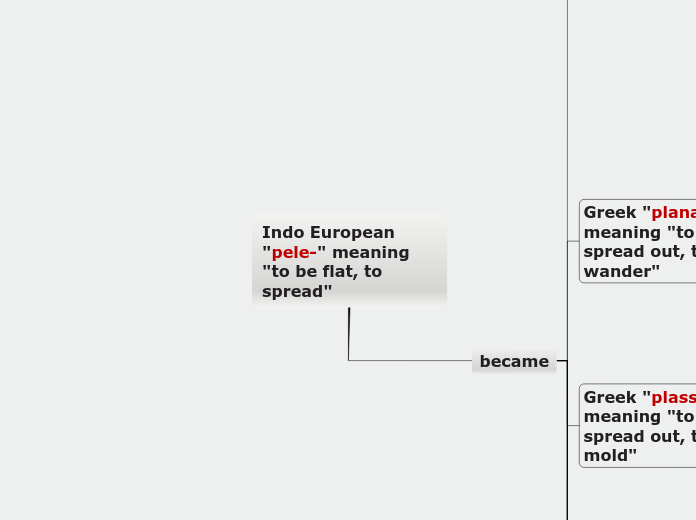por Mark Morton 3 anos atrás
846
cognates of plate
The Indo-European root 'pele-' meaning 'to be flat, to spread' evolved into various words across languages, often retaining the concept of flatness or spreading. In Germanic, it became '

por Mark Morton 3 anos atrás
846

Mais informações
polka meaning "a Polish woman"
polka (a kind of dance)
polka dot
French "flaneur" meaning "an idle man"
flaneur
The word "flaneur" is not very common in English.
In the nineteenth century, the flaneur was seen as a kind of gentleman -- a "man of leisure" who enjoys life by observing the world. Nowadays the word usually refers to someone who is lazy and disengaged.
field
Feldspar is "field mineral" -- that is, a kind of rock found in fields.
veldt
"Veldt" is not a common word in English. It's used mostly to refer to the grasslands of Africa.
floor
inspired
palm tree
The palm tree was named after the resemblance of its leafy branches to a human palm.
The Latin word "planus," meaning "flat" or "level," became the Italian word "piano," which meant "soft." This word was combined with another Italian word -- "forte" that meant "strong," to create "piano e forte," meaning "soft and loud," because that musical instrument had the ability to be played at different volumes. Over time, "piano e forte" became "pianoforte," which was eventually shortened to just "piano."
piano
A plane, in geometry, is a flat or two-dimensional surface.
A plan is a sketch made on a flat surface.
When you explain something, you make it "plain" to the other person -- that is, you make it flat, so that there are no obstacles in the way of understanding it.
Unlike the seemingly fixed stars, planets wander through the sky.
Latin "plantare" meaning "to drive into the ground with the foot"
supplant
"Supplant" originally meant "to make some trip." It now means "to replace someone, especially by sneaky means."
Latin "planta" meaning "a sprout"
plant
clan
A clan is a group of related people -- in other words, they have all grown from the same "sprout."
flatter
flat (UK English for "apartment")
flat
flounder
flan
A flan is a dessert with a flat top.
piazza
plateau
place
Spanish "plata" meaning "silver plate"
platinum
This is a great video! I never knew that platinum was so rare!
platitude
platypus
A platypus is a strange creature that is named after its feet. The word "platypus" actually means "flat foot."
plate